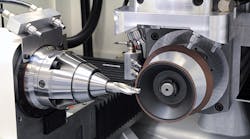Italian machine tool manufacturers posted a 14.3% annual increase in new orders for the first quarter of 2016, mainly on the strength of the domestic manufacturing sector. Export orders increased only slightly (1.7%) by comparison.
The results are reported by UCIMU - Sistemi per Produrre, a confederation of designers and manufacturers of machine tools as well as automation products. Italy has one of the largest machine-tool industries in the world, and the Q1 results represent a return to an expansion mode after a decline in the fourth-quarter 2015 results. That decrease followed eight consecutive quarters of expansion.
UCIMU reported that the Q1 2016 demand from Italian buyers grew 31.8% compared to the Q1 results for 2015. Foreign customers’ orders increased just 1.7% over the Q1 period for 2015.
“In these first months of the year, the demand for machine tools is getting stronger and is growing again considerably, after the slight slowdown experienced in the last period of 2015. All this proves that end-users, especially the Italian ones, are willing to invest,” according to Luigi Galdabini, president of UCIMU. “In this sense, the weakness at the end of last year is presumably to be attributed to the users' willingness to take their time in deciding which investments to make, in the light of what was presented at EMO Milano 2015 …”.
The EMO event last October, which UCIMU promoted along with CECIMO, the confederation of European machine tool industrial associations, drew more than 155,000 visitors to Milan.
Machine tool demand in general has been improving in Europe, though the manufacturers in that sector had endured several years of only modest activity.
The U.S. machine tool sector has faced tepid demand over the past two years, though the industry’s experts forecast orders will gradually improve over the remaining months of 2016. According to the monthly U.S. Manufacturing Technology Orders report published by AMT – the Association for Manufacturing Technology, U.S. machine tool orders declined during the first two months of this year, corresponding in part to the UCIMU Q1 report.










